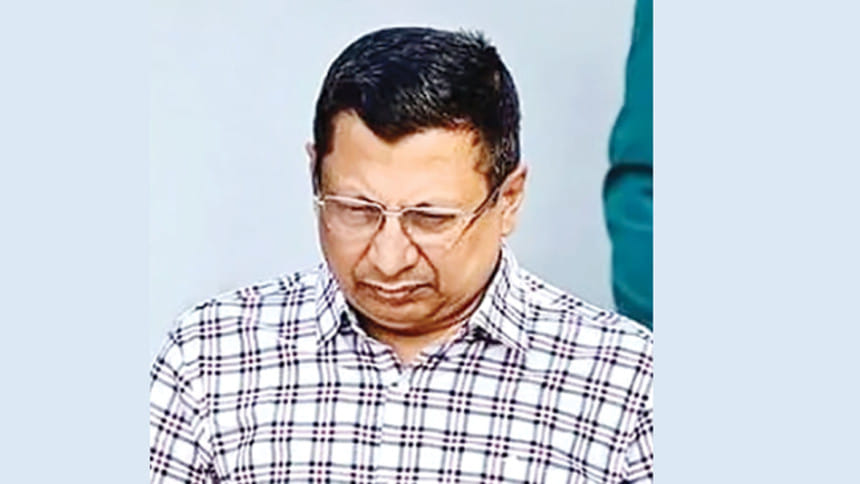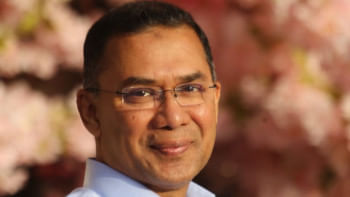Hasina, Kamal ordered shooting of July protesters

In a dramatic testimony before the International Crimes Tribunal-1 yesterday, former inspector general of police (IGP) Chowdhury Abdullah Al-Mamun said the mass killings during last year's July uprising were carried out on direct orders of then prime minister Sheikh Hasina and home minister Asaduzzaman Khan Kamal.
"I apologise to the victims' families, the injured, the nation, and the tribunal," Mamun said, appearing as an approver in a case filed over crimes against humanity committed during the uprising.
Besides him, Hasina and Asaduzzaman are also accused in the case.
Mamun had earlier pleaded guilty and sought permission to become an approver. The tribunal accepted his plea on the condition that he would make a full and true disclosure of information regarding the charges brought against him.
USE LETHAL FORCE
Mamun testified that on July 18, 2024, Asaduzzaman relayed Hasina's directive to use lethal weapons against protesters. Mamun shared the order with then additional DIG Proloy Kumar Joarder, who then passed it on to then DMP commissioner Habibur Rahman and others nationwide.
"From that day, the use of lethal weapons began. Habibur and DB chief Harun were overenthusiastic about the decision. The home minister's instruction was clear: suppress the protest at any cost."
Mamun added that drones and helicopters were deployed to locate protesters, following advice from then Rab DG Harun-Ar-Rashid. Block raids and mass arrests also began.
"Countless students and civilians were killed. Pro-Awami intellectuals, journalists, cultural figures, and business leaders encouraged Hasina to crush the movement."
Mamun named several influential figures who, according to him, pressed Hasina on the use of lethal weapons, including Anisul Huq, Fazle Noor Taposh, Salman F Rahman, Obaidul Quader, Jahangir Kabir Nanak, Mohammad A Arafat, Mirza Azam, Hasanul Haq Inu, and Rashed Khan Menon.
STUDENT LEADERS' DETENTION
Mamun told the tribunal that after the uprising began in July 2024, core committee meetings were held from July 19 onwards at Asaduzzaman's Dhanmondi home. Chiefs of law enforcement and intelligence agencies attended those meetings.
"At one core committee meeting, the decision was made to detain the coordinators of the Student Against Discrimination movement. This proposal came from the DGFI. I opposed it but later agreed following the home minister's order," Mamun told the tribunal.
He added that the responsibility was assigned to DB chief Harun-or-Rashid, who, along with the DGFI, picked up the coordinators and kept them in DB custody. Their family members were also brought in and the detained leaders were forced to announce the withdrawal of the movement in televised statements.
"DB chief Harun played a leading role in this," Mamun said, adding that the home minister used to call him "Jinn" because of his efficiency in executing any government order.
COORDINATION, SUPPRESSION
On August 4, 2024, a Security Coordination Committee meeting at the Gono Bhaban, attended by 27 top officials, including military and intelligence chiefs, planned to block the "March to Dhaka" scheduled for the next day.
Mamun said the police and army were instructed to coordinate operations, with DMP forces deployed at city entry points.
Later that night, a second meeting was held at the Gono Bhaban with Hasina, Sheikh Rehana, and senior security officials. The meeting reconvened inside the cantonment to finalise deployment plans, he said.
As protesters poured into Dhaka on August 5, Mamun learnt that Hasina would resign. He was airlifted to Dhaka Cantonment with senior officers.
His appointment as IGP was revoked on August 8, and he was arrested on September 3.
2018 BALLOT BOX STUFFING
Mamun also told the tribunal, "During the 2018 elections, the then IGP Javed Patwary advised Sheikh Hasina to keep 50 percent of the ballot boxes stuffed the night before the polls. Following that advice, the government instructed the local administration, law enforcement agencies, and party leaders and activists to implement the decision..."
He said the force had become politicised since 2014, especially by Gopalganj-based officers, with officers with many prioritising party agendas over regulations. Since there was a tussle between officers over who would succeed him, he was kept on as IGP on a contractual basis.
RAB ABUSES, SANCTIONS
During his tenure as Rab DG (April 2020–September 2022), Mamun said the Task Force Interrogation (TFI) cell routinely abducted, tortured, and secretly detained dissenters.
He said directives for enforced disappearances and crossfire killings came from the Prime Minister's Office via defence adviser Tarique Ahmed Siddique.
"I was aware of these abuses but lacked authority to intervene. The US sanctioned me, Rab, and its former DG for these actions."
GUILT, REMORSE
In an emotional conclusion, Mamun said his decision to become an approver stemmed from guilt over the mass killings.
"Hearing victims' testimonies and seeing footage of corpses being burnt shook me deeply. If this full account reveals the truth, I may find some peace.
"I served 36 years and a half in the police. There were never any allegations against me. But this massacre happened under my watch. I accept responsibility."
Mamun is scheduled for cross-examination today.


 For all latest news, follow The Daily Star's Google News channel.
For all latest news, follow The Daily Star's Google News channel. 



Comments